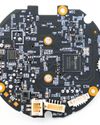
This project emulates a scoreboard by using a Raspberry Pi connected to a 64x32 LED Matrix. Using the touchscreen of a PiTFT, the user can select a team to display from collegiate and professional hockey, football, and basketball. The user can also select rotation between teams instead of displaying only one team. The system then queries the ESPN API to get live scores from the Internet according to the user's settings. Finally, the team names, logos, and scores are displayed on the LED matrix. The scoreboard displays a celebration whenever a team scores in football or hockey.
When the selected team is not currently in a live game, the scoreboard displays the results of the previous game or the date, time, and opponent in the next game, depending on which is closer in time. Using cron, a command-line utility for scheduling jobs, the service starts on automatically on boot and defaults to displaying any supported sport and team.
HARDWARE DESIGN
The hardware consists of three major components: a Raspberry Pi 4, a touchscreen PITFT, and a 64x32 LED Matrix. The Raspberry Pi contains a 16GB SD Card with the default Raspberry Pi Linux installed. As shown in Figure 1, The LED Matrix gets 5V of power from the included DC adapter, the PiTFT gets power from the Raspberry Pi, and the Raspberry Pi gets 3.3V from the included USB-C cable. The LED Matrix gets wired to the Raspberry Pi's GPIOs, according to Table 1 and Figure 2, while the PiTFT header is designed to simply snap onto the top of the Raspberry Pi [1]. LED Matrix pins are numbered left to right, and top to bottom.
SOFTWARE DESIGN
This story is from the September 2024 edition of Circuit Cellar.
Start your 7-day Magzter GOLD free trial to access thousands of curated premium stories, and 9,000+ magazines and newspapers.
Already a subscriber ? Sign In
This story is from the September 2024 edition of Circuit Cellar.
Start your 7-day Magzter GOLD free trial to access thousands of curated premium stories, and 9,000+ magazines and newspapers.
Already a subscriber? Sign In

New TI MCUs Enable Edge AI and Industry-Leading Real-Time Control to Advance Efficiency, Safety, and Sustainability
Texas Instruments (TI) introduced two new series of real-time microcontrollers that deliver advancements to help engineers achieve more intelligent and secure processing in automotive and industrial applications.

Using Amazon Alexa to Control Custom IoT Gadgets
In part two of his article, Brian describes integrating custom IoT gadgets with Amazon Echo using emulation to receive spoken alarms. In part one, he used emulation and Arduino Cloud services as a middleman.

Holiday Hangover Hardware Hacking
Having too much cheer during the holidays? In this month's article, Colin offers a diversion from the jolly season by urging developers to retreat to the basement to brush up on hardware hacking skills. He shows how a low-cost Raspberry Pi Pico and a TP-Link Tapo C200 smart IP camera could become the next automated bird deterrent or a home automation server.

Datasheet: Microamps Per Megahertz Ultra-Low Power MCUs Minimize Current Consumption
How do chip makers differentiate if many ultra-low power MCUs on the market feature the same processor core? The peripherals and different power states offer various ways to manage current consumption down to microamps per megahertz.

Smart Home Lock Down Matter Provides Security Blanket
As more devices in the smart home connect to the Internet, they become increasingly vulnerable to outside attacks. Developers can now add the latest security measures to their Smart Home devices through Matter.

Basic Pulse Circuits
In part one of a three-part series, Wolfgang wrote how basic pulse circuits help digital circuits, such as embedded boards with ARM processors, deal with pulse trains or bursts of pulses from the outside. In Part 2, he dives into enabling flip-flops, timing parameters, and synchronization, design tasks needed to capture, detect, and filter pulses.

Building a Wi-Fi Router Watchdog
Dev created a watchdog for a Wi-Fi extender using a Raspberry Pi Pico. This monitors Wi-Fi connectivity for his smart home lighting system, which would require a reset twice a year due to rapid power interruptions.

Create Your Own PCBs with a CNC Milling Machine
Using KiCad, CopperCAM, and Candle Software

Performance Bottlenecks in Embedded Linux Solutions Analysis, Identification, and Mitigation
Good performance is a requirement for every technology, and system designers rely on operating systems to ensure fast and smooth transitions in critical applications. Fortunately, Pedro writes, the embedded Linux OS offers ways for finding, analyzing and mitigating performance bottlenecks so embedded systems can deliver the speed and efficiency that end users expect.

Renesas New RA8 Entry-Line MCU Groups Brings High Performance of Arm Cortex-M85 Processor to Cost-Sensitive Applications with Market-Leading CoreMark Performance
Renesas Electronics Corp., a premier supplier of advanced semiconductor solutions, introduced the RA8E1 and RA8E2 microcontroller (MCU) groups, extending the industry's most powerful series of MCUs.